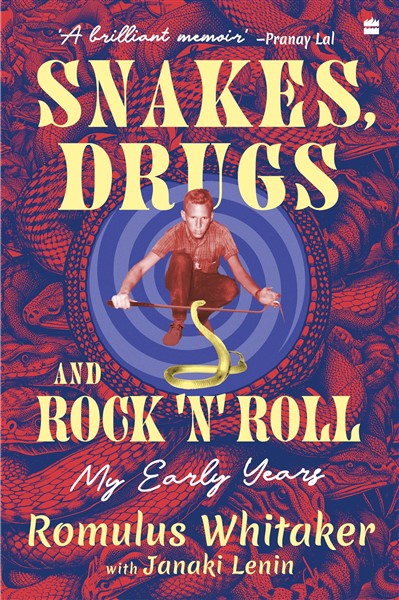Romulus Whitaker’s entertaining memoirs also bring the India of the 1950s and the US of the ‘60s to life
Snakes, Drugs and Rock ’N’ Roll: My Early Years
By Romulus Whitaker with Janaki Lenin
HarperCollins, 400 pages, Rs 699
 Romulus Earl Whitaker, affectionately known as the ‘Snakeman of India’, is a legend in the arena of wildlife conservation. He has had a lifelong love affair with the environment and the ‘fierce creatures’ who share the planet with us.
Romulus Earl Whitaker, affectionately known as the ‘Snakeman of India’, is a legend in the arena of wildlife conservation. He has had a lifelong love affair with the environment and the ‘fierce creatures’ who share the planet with us.
The story of his life is colourful, lively and rambunctious. “For years I’ve recounted parts of my story for willing listeners. Often, these sessions would end with a request to write a book,” he writes in the introduction to the first volume his memoirs, ‘Snakes, Drugs and Rock ’N’ Roll: My Early Years’.
For those who may not know, Romulus Earl Whitaker III (b. 1943) is famous for establishing the Madras Snake Park, the Madras Crocodile Bank Trust, the Andaman and Nicobar Environmental Team, as well as his work conserving India’s rain forests—the habitat of so many endangered species. Internationally, he has received the Rolex Award for Enterprise as well as the Whitley Award for his contribution to nature conservation, and in 2018 he was awarded the Padma Shri. Whitaker has co-authored ‘Snakes of India: The Field Guide’ with Ashok Captain which is considered the definitive work on the subject.
The first volume of the memoirs, covering the span between ages four and twenty-four, “sets the foundation of why and how I made a career for myself in reptiles in India”. Given that the opening volume is a rollicking read, the concluding part will be eagerly awaited.
The story begins in with his childhood in India. When Rom’s mother married Harindranath and Kamaladevi Chattopadhayaya’s son and moved to Mumbai, Whitaker was transplanted from a conventional childhood in the US to (what was for him) the exciting world of India. From the beginning, he was fascinated by India, humans as well as animals. Sent to boarding school in Kodai, he kept a pet python in a tin trunk under his bed and realised, from an early age that all he really wanted to do was to work with snakes. Sent to the US for college, reuniting with his own father, Whitaker soon realized that he preferred snakes to lecture halls and left to work in a Florida snake farm. His adventures are hair-raising, and often hilarious.
Whitaker’s encounters with people and snakes in India, the US and on his voyages are related with vividness and humour which recall Gerald Durrell’s classic, ‘My Family and Other Animals’. A major theme in the book is his transformation from a hunter to protector.
Well written, fast paced and a page-turner, this first volume of his fascinating memoir brings the India of the 1950s and the US of the ‘60s to life. It is the story of a boy who would become one of the greatest conservationists of his generation, discovering the wonders of India’s extraordinary natural world.
“In this, the first volume of my memoirs, I am divulging how my snake obsession began very early, how I moved to India and spent more time hunting than at school, and my pivotal experience of working at the largest snake venom lab in the world, the Miami Serpentarium,” Whitaker noted in a statement. “On this journey, I circled the world as a merchant seaman, hitchhiked across America hunting snakes and was drafted into the US Army to set up a blood banking operation in Japan during the Vietnam War. Looking back at my adventures, all I can do is shake my head in disbelief. Welcome to my world.”
His wife and co-author Janaki Lenin added, “Rom is unflappable even in a crisis, which makes him seem sensible and cool-headed. But don’t let that fool you. The man is bonkers about snakes and will do anything in the pursuit of his passion. This book is the evidence.”
Lenin, who writes about wildlife and conservation and the intermingling of human and animal destinies, said, “I sometimes have a hard time separating my mundane reality from his exciting one. As anyone who has listened to his stories will attest, Rom is a great raconteur, and I can’t wait to see how this attempt to capture the essence of his experiences is received by readers.”
